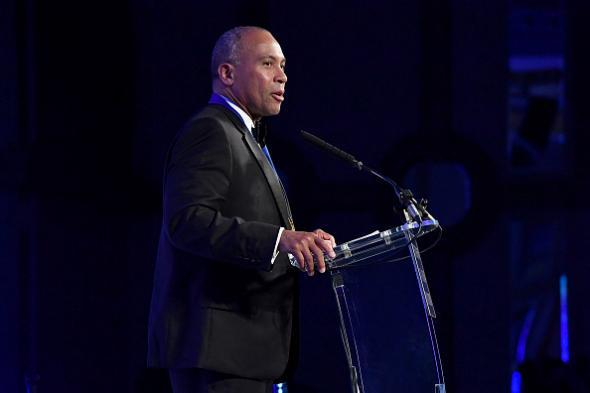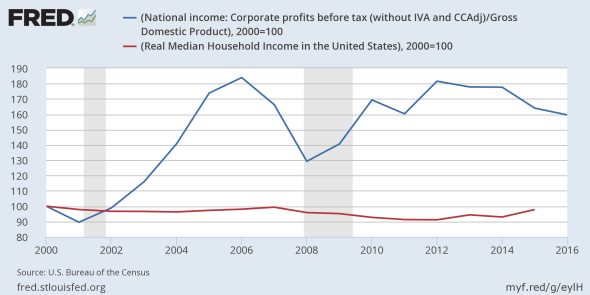
Larry French/Getty Images for the Jefferson Awards Foundation
The world of finance! There’s nothing inherently wrong with it. People need banks so they can buy houses and cars, and need to invest their money for retirement and whatnot. Some of my closest friends work in finance, and I enjoy being invited to their beautiful country homes, where I drink their pink lemonade and lounge on their fine divans.
And yet … do I think that any of these friends of mine should run for president in 2020 on the ticket of America’s liberal party during an era of unprecedented wealth inequality and consolidated corporate power? No! And neither should Deval Patrick, the ex–Massachusetts governor who now works for Bain Capital and is for some reason the subject of a Tuesday Politico story with this headline:

Screenshot/Politico
You may remember Bain Capital as the private-equity company co-founded by Mitt Romney—as in, the Mitt Romney who Barack Obama (a Democrat) effectively attacked for enriching himself through mass layoffs during a 2012 election that many “Obama insiders” should have at least a passing familiarity with. As it happens, many Obama voters—including those in, to name three states at random, Pennsylvania, Wisconsin, and Michigan—would go on to vote four years later not for the Democratic candidate whose insider connections and high-priced speeches to Goldman Sachs became a major campaign issue, but for the Republican candidate who made repeated and energetic (albeit totally dishonest) promises to stick it to the rich and powerful. Apparently Obama insiders do not have a passing familiarity with that election, but it was bad. It was a problem.
This is not merely a matter of “optics” or electoral strategy, though. It’s also a matter of principle. Individuals whose main day-in, day-out concern is the well-being of financial service executives and corporate shareholders naturally tend to advocate policy goals friendly to the interests of financial services executives and corporate shareholders. Those interests sometimes, but do not always, overlap with the interests of potential Democratic voters, as this comparison of corporate profits to inflation-adjusted household income during the 21st century indicates:

Federal Reserve via Jordan Weissmann
Corporate profits: way up! Income for normal people: eh.*
One group that believes that Democrats shouldn’t overtly represent the interests of the wealthy, in fact, is the current Democratic Party. Even Senate Minority Leader Chuck Schumer, a New Yorker who counts Wall Street executives among his most prominent constituents (and top donors), is on board with a 2018 Democratic platform that frames the party’s agenda as a matter of increasing wages while diminishing corporate power. Is a finance executive who conducted his Politico interview at “Bain headquarters in Boston” really the ideal messenger for this sales pitch?
The Politico article acknowledges this practical reality, sort of, writing that “Bernie Sanderized Democrats … are suspicious of finance types to begin with, and were taught by Obama’s 2012 brutal campaign attacks on Mitt Romney to think of Bain as a curse word.” (Again, though, the group that swung the 2016 election was not “Bernie-addled coastal leftist elites,” it was former Obama voters in the Midwest.) The piece then suggests that Democratic voters in 2020 might rally around the idea of “taking on Trump’s management shortcomings” and “calling for a different way of merging government and business experience.” And, well, I suppose anything can happen in three years, but if the 2020 Democratic primary turns on an angry base’s passionate demand for “a different way of merging government and business experience,” I will eat a hard copy of the Mitt Romney “47 percent” video.
Politico, incidentally, published more or less this same piece—a 2020 “will he run?” trial balloon describing momentum building behind a candidate who has good relationships with party operatives and wealthy donors—in July, except that one was about Andrew Cuomo, who would also be a bad 2020 nominee. I look forward to reading “Democratic Insiders Are Buzzing About This Anthropomorphic Stack of $100 Bills” in Politico in September.
*Correction, Aug. 1, 2017, at 2:10 p.m.: This post initially included a graphical comparison of GDP growth to real income growth rather than the comparison of corporate profits to real income described in the text. Classic economics graph mix-up!